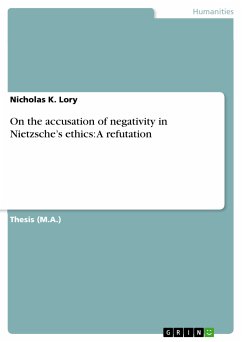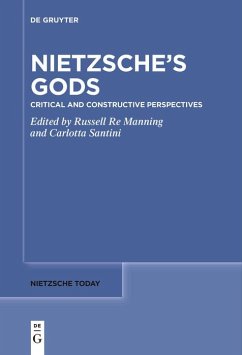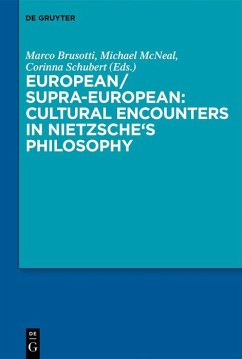
On the accusation of negativity in Nietzsche's ethics: A refutation (eBook, ePUB)

PAYBACK Punkte
0 °P sammeln!
Thesis (M.A.) from the year 2011 in the subject Philosophy - Philosophy of the 19th Century, grade: 1st Class (80%), Durham University, course: Philosophy and Psychology, language: English, abstract: Nietzsche, considerably more than most other philosophers, has permeated Western popular culture to the extent that most people will have heard his name and even harbour certain connotations with it. Given the manner in which Nietzsche is most often portrayed in popular culture, it is unsurprising that these connotations are predominantly negative. "Conan the Barbarian", for example, opens with Ni...
Thesis (M.A.) from the year 2011 in the subject Philosophy - Philosophy of the 19th Century, grade: 1st Class (80%), Durham University, course: Philosophy and Psychology, language: English, abstract: Nietzsche, considerably more than most other philosophers, has permeated Western popular culture to the extent that most people will have heard his name and even harbour certain connotations with it. Given the manner in which Nietzsche is most often portrayed in popular culture, it is unsurprising that these connotations are predominantly negative. "Conan the Barbarian", for example, opens with Nietzsche's line, "What does not kill us, makes us stronger," indicating a certain encouragement of brutish barbarianism. Moreover however, Nietzsche's philosophy is associated with cruelty in Polanski's "Death and the Maiden", in which Dr.Miranda, who tortured and raped political prisoners, is recognised for his tendency to quote Nietzsche. Perhaps Nietzsche's most widespread association, is however with Hitler. I argue that these negative associations are not only inaccurate, but in fact quite ironically opposite to the philosophy that Nietzsche actually promoted. While accusations related to Nazism can relatively easily be refuted, accusations of brutishness, elitism and immorality are not entirely unfounded: Nietzsche encouraged strength and power; called himself an "immoralist"; rejected democracy and human equality, and promoted the notion of an "Übermensch". At first glance, Nietzsche's philosophy thus appears to support the aforementioned, negative conclusions. It is for this reason precisely that short quotes by Nietzsche rarely do his entire philosophy justice. As will be seen presently, it is vital that Nietzsche's philosophy be understood in its entirety if we are to realise its true, severely positivist nature. Such a reading will however not suffice to reveal Nietzsche positivism; judgements of Nietzsche promoting an inherently negative philosophy are present even in academic treatments of him, by authors who have, presumably, considered Nietzsche's philosophy with some deliberation. It is among such academics that the most serious accusation against Nietzsche arises; that of Nietzsche being a nihilist.3 As with the other accusations, Nietzsche being labelled a nihilist is not unfounded; Nietzsche did promote nihilism. Similar to those other accusations however, it is of vital importance to understand Nietzsche's promotion of nihilism in the context of his philosophy as a whole. By doing so, it becomes clear that Nietzsche (somewhat ironically) treats nihilism as a means an end, to present an inherently positive and life-affirming philosophy.
Dieser Download kann aus rechtlichen Gründen nur mit Rechnungsadresse in A, B, BG, CY, CZ, D, DK, EW, E, FIN, F, GR, HR, H, IRL, I, LT, L, LR, M, NL, PL, P, R, S, SLO, SK ausgeliefert werden.













